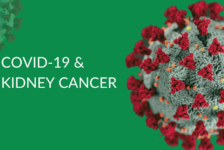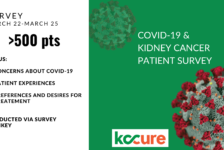According to our latest survey, 70 percent of patients believe they are at high risk for COVID-19. This page is designed to address some of the most frequently asked questions we have received about Kidney Cancer Patient Risks for COVID-19.
Does my kidney cancer treatment increase my risk of acquiring COVID-19? Should I stop treatment?
Many of the current resources available for cancer patients provide general information for patients being treated with cytotoxic chemotherapy, drugs that can weaken the immune system. Unlike other cancers, chemotherapy is rarely used for RCC. None of the approved treatments for RCC are chemotherapeutic drugs.
Treatments for kidney cancer include targeted agents, including: Sutent, Cabometyx, Inlyta, Votrient, and Lenvima and immunotherapy treatments, including: Opdivo, Opdivo+Yervoy and Keytruda. Increased risk of viral infections is not generally associated with these treatments.
Guidance from the American Society of Clinical Oncologists (ASCO), does not recommend routinely withholding cancer treatment as a result of the COVID-19 outbreak. You and your doctor should discuss the balance of potential harms from delaying or interrupting your cancer treatment versus the potential benefits of possibly preventing or delaying COVID-19 infection.
While kidney cancer treatment might not result in increased risk, patients who have metastatic cancer in their body may be at higher risk of developing complications from COVID-19. It is recommended that all patients receiving treatment for advanced kidney cancer take extra precautions to avoid risk of exposure to COVID-19.
Does having one kidney mean that I am at higher risk of acquiring COVID-19 or having complications from COVID-19?
If you have one kidney (or lost part of a kidney due to a partial nephrectomy) but are otherwise healthy, then your risk of acquiring COVID-19 would likely be similar to someone with two kidneys.
Every situation is unique, and many factors can result in increased risk. You should consult with your health care provider for information about your individual risk.
You may have seen information about the risk of COVID-19 for patients with chronic kidney disease (CKD). Most patients with kidney cancer do not have chronic kidney disease (CKD). If you have chronic kidney disease (CKD), you can find more information about your risk of COVID-19 here.
Does COVID-19 attack the kidneys?
Most people infected with COVID-19 have mild to moderate symptoms. In those patients, there is no evidence showing that COVID-19 adversely affects the kidneys. A small proportion of patients with COVID-19 develop severe infection and require hospitalization. According to the International Society of Nephrology, in these hospitalized patients, a small proportion (15 percent) developed a decline in filtration function of the kidneys.
COVID-19 is a new virus and doctors still are learning about how it impacts individuals. The long-term health effect of kidney injury on survivors of COVID-19 infection is not known.
What can I do to reduce my risk?
Reducing touch-points, including hospital visits and in-person appointments, can help reduce exposure and free up health care resources for emergency situations.
The federal government, as well as many state governments, have changed rules and eased restrictions on tele-health appointments. Ask your doctor what options are available for you to avoid in-person appointments.
Here are some additional suggestions to reduce touch-points that patients might want to consider discussing with their doctor.
| Newly diagnosed patients with asymptomatic localized renal masses | Discuss with your doctor the risks vs. benefits of delaying surgery for 1-2 months |
| Patients with localized disease who are getting structured surveillance | Discuss with your doctor the risks vs. benefits of delaying scans for 1-2 months. |
| Newly diagnosed patients with intermediate/high risk metastatic kidney cancer | Discuss the risks vs. benefits of beginning infusion therapy immediately; ask about oral treatment options. |
| Patients with metastatic disease receiving infusion therapy | If receiving maintenance bi-weekly nivolumab (Opdivo), discuss moving to monthly infusions; Discuss the risks vs. benefits of treatment pauses for your individual case. |
Be sure to check back for additional updates as more information becomes available.
Please note: The material on this site is for informational purposes only and is not a substitute for professional medical advice, diagnosis or treatment for a specific medical condition. You should not use information on this website to diagnose or treat a health problem or disease and should consult with a qualified healthcare provider with any questions or concerns you may have regarding your condition.



